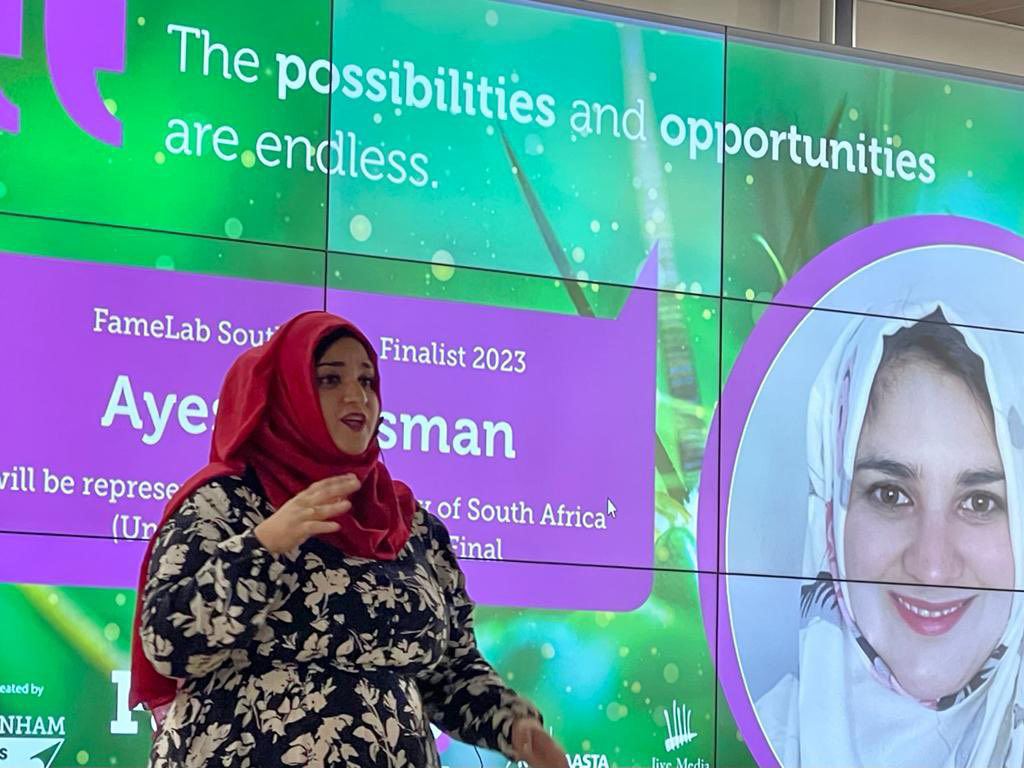News & Events
Unisan shines at FameLab SA competition
“Being the first runner-up at the 2023 FameLab SA competition is an incredible honour and achievement. It's a testament to the hard work, dedication, and passion put into the science communication journey,” says Ayesha Osman, a PhD candidate in chemical engineering and a lecturer in the Department of Civil and Chemical Engineering at Unisa.

Ayesha Osman, science communicator par excellence (Photo Credit: Jive Media Africa)
While winning is always exciting, Osman says being recognised as the first runner-up is a source of pride and motivation to continue refining her skills and contributing to the field of science communication. She says the experience has been invaluable and she is now eager to build on this foundation for future opportunities in sharing the wonders of science with a broader audience.
FameLab is an international science communication and public speaking competition that promote science and technology by creating a platform for young scientists to reach wider audience.
Before participating in the regional, semi and final legs of the FameLab competition, Unisa, through Jive Media Africa, offered Osman and her peers training on science communication.
“Participating in the FameLab SA competition and undergoing training in science communication have been an incredibly rewarding experience,” she reflected.
The training provided a valuable platform to refine her communication skills, enabling her to convey complex scientific concepts in an accessible and engaging manner.
The competition itself offered a unique opportunity to connect with diverse audiences, share her passion for science and receive constructive feedback.
Looking back on her 2023 science communication experience, Osman said, “Overall, the entire journey has been enriching, contributing not only to my ability to communicate effectively but also fostering a deeper appreciation for the importance of science outreach and public engagement.”
Science communication is crucial for academics
For academics, science communication is crucial in reaching a wider audience outside of academia and Ayesha Osman mentioned the following as reasons why:
- Public understanding: Communicating research findings to the public helps in creating awareness and understanding of complex scientific concepts. It bridges the gap between academic knowledge and public comprehension, fostering an informed society.
- Community engagement: Engaging with community allows academics to share the relevance of their research to everyday life. It builds connections, trust and support for scientific endeavours.
- Funding and support: Effective science communication is vital for securing funding and support. Clearly conveying the significance and impact of research increases the likelihood of attracting resources and collaboration opportunities.
- Policy influence: Scientists can contribute to evidence-based policymaking by effectively communicating their findings. This enables academics to play a role in shaping policies that are informed by scientific evidence.
- Career advancement: Communicating research effectively enhances an academic's reputation and visibility within the scientific community and beyond. It can lead to collaborations, invitations to speak at conferences and increased opportunities for professional growth.
- Inspiring the next generation: By sharing their passion and knowledge, academics inspire the next generation of scientists. Effective communication can ignite curiosity, encouraging students to pursue careers in STEM fields.
In essence, science communication not only contributes to the public's understanding of science, but also benefits academics in various aspects of their careers and the broader impact of their research.
Are you a young scholar in Science, Technology, Engineering and Mathematics (STEM) and doing brilliant research that can be narrated in three minutes? Be on the lookout for the 2024 FameLab call for participation scheduled for 11 and 12 June.
* Compiled by Mpho Moloele, PR and Communications, Department of Research, Innovation and Commercialisation
Publish date: 2024-01-30 00:00:00.0

